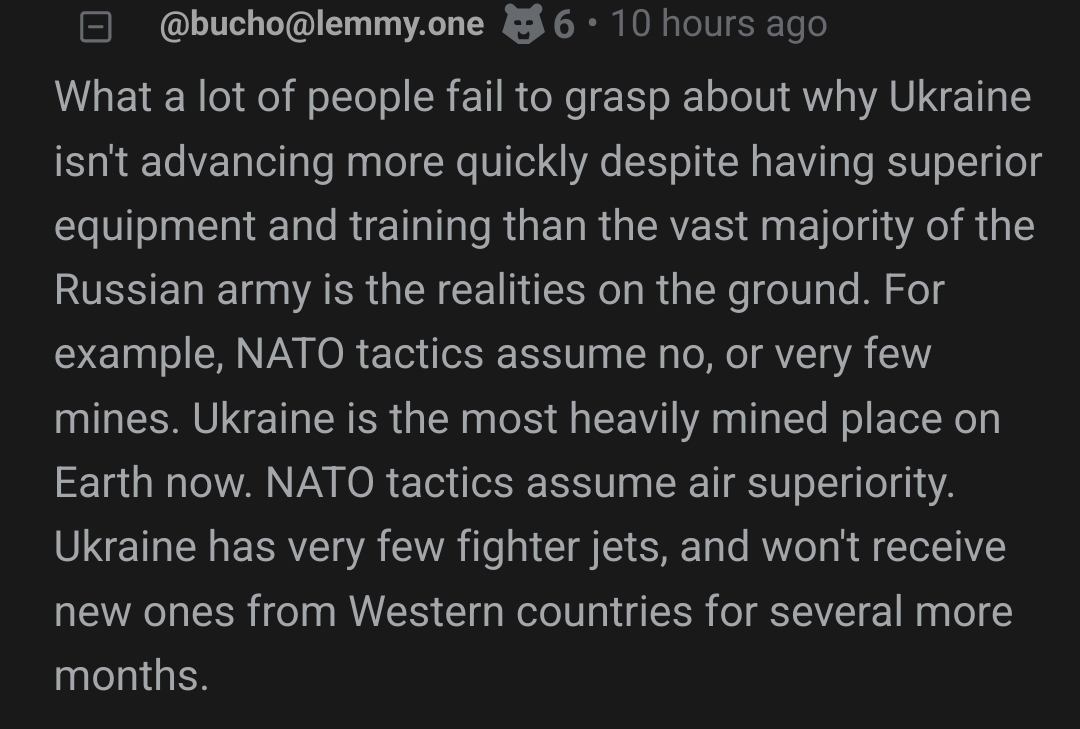the_dunk_tank
It's the dunk tank.
This is where you come to post big-brained hot takes by chuds, libs, or even fellow leftists, and tear them to itty-bitty pieces with precision dunkstrikes.
Rule 1: All posts must include links to the subject matter, and no identifying information should be redacted.
Rule 2: If your source is a reactionary website, please use archive.is instead of linking directly.
Rule 3: No sectarianism.
Rule 4: TERF/SWERFs Not Welcome
Rule 5: No ableism of any kind (that includes stuff like libt*rd)
Rule 6: Do not post fellow hexbears.
Rule 7: Do not individually target other instances' admins or moderators.
Rule 8: The subject of a post cannot be low hanging fruit, that is comments/posts made by a private person that have low amount of upvotes/likes/views. Comments/Posts made on other instances that are accessible from hexbear are an exception to this. Posts that do not meet this requirement can be posted to !shitreactionariessay@lemmygrad.ml
Rule 9: if you post ironic rage bait im going to make a personal visit to your house to make sure you never make this mistake again
view the rest of the comments


You seem to have misread my point about individual fighting. I am not suggesting the Spartans though you could Jedi your way through war. They were very aware that the opposite is the case and so are known to have banned wrestling competitions and such, as distractions from proper military training. I was simply pointing out the invalidity of the idea that they were individually superior super soldiers - a part of the myth - and that this would have been irrelevant anyhow.
You seem to have misunderstood my other point. We are not talking about whether they could effectively wage war in their social context. Obviously they could. So could everyone else. They were notable in the group. We are discussing a myth which has long permeated throughout Western culture of the Spartans as this Herculean race of warriors unparalleled in the arts of war, whereas there is no evidence for this.
During the Archaic period they showed no superiority whatsoever. Their power increased during this period, but this is almost certainly simply due to the fact that they were more populous, having more citizens than the neighboring poleis. They were one of the largest cities in ancient Greece. No sources tell thus anything about any peculiar form of military excellence compared to any other group of people. Ancient stories from the time in fact tell of Argos, not Sparta, as were the best warriors were from. In a later battle with the Argives in 550BC they would come out equally badly. Nor do the Spartan poems/songs we have from this time suggest their eminence. The end point of this period includes Thermopylae. Herodotus was born a few years before the battle. He gushes about them, because he lived in a climate of their propaganda. But he does not actually produce any evidence in his descriptions of the battle that show any kind of actual superiority. Operationally, they fight like everyone else. All they did was try take advantage of terrain, like every other army in history with two neurons to rub together. Again, it was, tactically, a crushing defeat. We know the accounts are propagandized because the Spartans did not make up the majority of the fighters there, thought they led it, yet we almost only hear about them, including in the generation after the battle. It is only after Thermopylae that they build up their legendary reputation. They surrendered at the battle of Sphakteria (425 BC).
It is only after Thermopylae and the Persian war that the Spartan develop some very limited tactics that give them some edge, perhaps, but this was balanced by many other factors. Their basic institutions remained like those of the other Hellenes. They were never militarized from birth to be supersoldiers. No source ever tells us or demonstrates their individual superiority as warriors or generals. The had no proper light infantry, and their cavalry was worthless (see Xenophon, Hellenika 6.4.10-11). They were regularly soundly defeated when battles relied on these other factors. The only edge they had was in their phalanx tactics. They were disciplined with decent officers, communications, commands and manoever, physically fit and effective at formation drill, which other states didn't do and was significant. This allowed them to win pitched hoplite battles, until the defeats by Thebes at Tegyra, Leuktra and Second Mantineia, but this is a basic form of warfare and speaks rather to how unsophicated archaic and classical greek warfare was. But their only significance was in the Greek Pelopponese, and was they faced militaries with far more sophicated militaries they didn't stand a chance.
For a brief period of time - and only after Thermopylae - they were better at a a very limited form of pitched hoplite warfare due to their emphasis on training and discipline. But they showed no significant advances in any other areas. Actually, precisely their overeliance on this form of warfare, due to their social class structure (which didn't really allow for light infantry and effective cavalry), lead to their military abilities being very limited and falling behind other powers. While their superiority amongst local Greek states in this sense was clear, it was overall marginal in my opinion when we include other factors like military diversity, strategy, and economic power. The dominance at this specific form of warfare lasted, say, 150 years. Their actual political domination of Greece far less time, say 30 years.
Critical support to @StalinForTime@hexbear.net in comrades protracted people's war against the myth of Sparta.